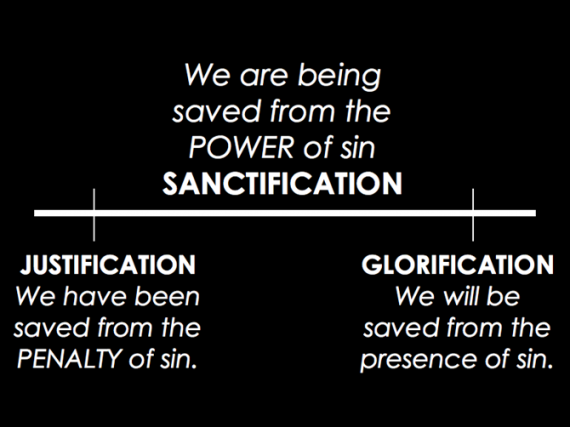
As with much of what I write on this blog, my current blog series on Calvinism will eventually become a book. I have decided to call this book The Words of Calvinism and the Word of God. To make sure you get a free PDF of this book when it comes out, please request to get updates from me using one of the forms on this site.
Until then, I will try to update this page with the current list of blog posts on Calvinism. Please note that even though you will be able to read much of the content of this book using the links below, the final version of the book will be altered and updated to reflect additional research and any changes I might want to make to the posts based on the feedback and comments I receive on each individual post.
In other words, please read through the posts and leave comments! I value your input and learn from your suggestions — even if it is just to point out a typographical mistake!
So here are the posts in this series on Calvinism so far:
Introduction to Calvinsim
- I believe in the Five Solas of the Reformation
- My Personal History with Calvinism
- A Brief History of John Calvin
- A Brief Summary of Calvinism
- A Summary of Calvinism from Calvinists
- Calvinism’s TULIP by any other name still doesn’t smell as sweet
Calvinism and the Dictionary
- Faith
- Gospel
- Salvation
- Forgiveness – Two Kinds of Forgiveness: One is free; one is conditional
- Repentance – Repentance is not a condition for eternal life
- Eternal Life
- Grace
- Calvinism and the NIV
- 3 Tactics Calvinists Use Against Non-Calvinists
Total Depravity
- Total Depravity According to Calvinists
- Total Depravity according to Scripture
- Calvinism and Genesis 6:5
- Genesis 6:6 and Genesis 8:21 do not teach Total Depravity
- Are People Born in Sin? (Psalm 51:5)
- Psalm 143:2 does not teach Total Inability
- Does Ecclesiastes 7:20, 29 teach Total Depravity?
- Isaiah 53:6 and Isaiah 64:6 Do Not Teach Total Depravity
- Does Jeremiah 17:9 teach Total Depravity?
- John 3:3 Does Not Teach Total Inability
- John 6:44 is a key text for Total Depravity. Too bad it doesn’t teach it…
- John 8:43 does not teach total inability
- John 15:4-5 Does Not Teach Total Inability
- Is Paul teaching Calvinism in Romans 3:10-12?
- Paul Does Not Teach Total Depravity in Romans 3
- Humans have three parts: Body, Soul, and Spirit
- Romans 7: Did Paul Struggle with Sinful Flesh?
- Romans 8:7-8, Enmity with God, and Calvinism
- Can the Unbeliever Understand the Things of God? (1 Corinthians 2:14)
- Removing the Veil from the Gospel – 2 Corinthians 4:3-4
- 7 Uses of the word “Dead” in the New Testament
- What does it mean to be dead in sin? Ephesians 2:1-3
- The Secret Logic Behind Total Depravity
- Is faith the gift of God in Ephesians 2:8-9?
- Are All Gentiles Depraved in the Mind? (Ephesians 4:17-19)
- If Judaizers are Right, then they’re Wrong (Titus 1:15)
- Is the World Controlled by the Devil? 1 John 5:19
- Why 1 John 5:1 does not teach that regeneration precedes faith
- The Last Word on Total Depravity
Unconditional Election
- Unconditional Election According to Calvinists
- Unconditional Election According to Scripture
- The Last Word on Unconditional Election
- Coming Soon!
Limited Atonement
- Posts Coming Soon!
Irresistible Grace
- Posts Coming Soon!
Perseverance of the Saints
- Posts Coming Soon!
The Sovereignty of God
- Posts Coming Soon!




 One way that some people limit grace is when they try to differentiate between “cheap grace” and “costly grace,” or start trying to limit the application of God’s grace by using theological terms like “prevenient grace” or “efficacious grace.”
One way that some people limit grace is when they try to differentiate between “cheap grace” and “costly grace,” or start trying to limit the application of God’s grace by using theological terms like “prevenient grace” or “efficacious grace.”

 In previous posts we looked at several words that do not refer to eternal life:
In previous posts we looked at several words that do not refer to eternal life: 

 As this inheritance is almost always associated with obedience or a life of faithful living, people who think that our inheritance is the same thing as eternal life from God will get very confused about how to receive eternal life.
As this inheritance is almost always associated with obedience or a life of faithful living, people who think that our inheritance is the same thing as eternal life from God will get very confused about how to receive eternal life. Most people do not realize it, but the biblical teaching on rewards is one of the most prevalent teachings in the New Testament. The concept is everywhere. And much like inheritance, the biblical teaching on rewards often includes calls for faithfulness, obedience, self-sacrifice, and loving service.
Most people do not realize it, but the biblical teaching on rewards is one of the most prevalent teachings in the New Testament. The concept is everywhere. And much like inheritance, the biblical teaching on rewards often includes calls for faithfulness, obedience, self-sacrifice, and loving service.

 Many Christians believe that these terms refer to “heaven” itself, and more specifically, when Scripture talks of entering or inheriting the Kingdom, that this refers to going to heaven when we die.
Many Christians believe that these terms refer to “heaven” itself, and more specifically, when Scripture talks of entering or inheriting the Kingdom, that this refers to going to heaven when we die.